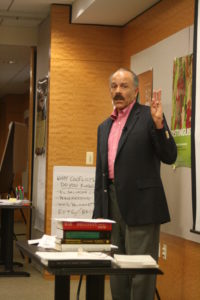 This blog post is authored by Adriana Aristeiguieta, an intern this summer in the Office of the General Counsel’s office.
This blog post is authored by Adriana Aristeiguieta, an intern this summer in the Office of the General Counsel’s office.
Gary Solis – 26-year Marine veteran, lawyer, Georgetown Law adjunct professor, and author of The Law of Armed Conflict: International Humanitarian Law in War – spoke last week at the Exploring Humanitarian Law Summer Institute on the subject of the United States Military and the Law of Armed Conflict. Each year, teachers from around the country flock to Washington to learn more about including the subject of human dignity, war and conflict and other humanitarian issues into their classrooms. As a summer intern with the American Red Cross, I got a front-row seat for his presentation, which was both compelling and flawlessly delivered. It gave the audience, me included, a unique view into how International Humanitarian Law (IHL) is taught to members of our armed forces. Because even war has limits; and IHL is a critical part of that.
He began with an outline of what the military does well, including making sure that all service members receive humanitarian law training initially but also on an ongoing basis. He noted that the military is very good at one thing – giving orders. This ability to issue orders with the confidence that those orders will be followed is what guarantees that all soldiers and service members will be exposed to IHL. It is this knowledge of IHL that allows for the military to effectively prosecute war crimes when they arise. Additionally, repeated exposure to IHL makes it impossible to claim that “I was just following orders” as a defense for following an unlawful order and committing a potential war crime.
Solis noted that while he believes that the military is effective at making sure that every service member knows about IHL, he is less certain that the training itself is always effective. He went on to add, however, that while the system may not always be perfect, it is worlds better than what was in place during his early days in active duty during the Vietnam era. The establishment of an all-volunteer military where the overwhelming majority of recruits possess at least a high school education has led to a decline in the prevalence of possible violations of IHL. Overall, he was confident that the things that the military is good at adequately balance the things that they still need to improve on. The overall message as someone who has lived and breathed IHL both on the battlefield and beyond, is that education in the laws of armed conflict is an essential part of building respect for these rules and principles.

